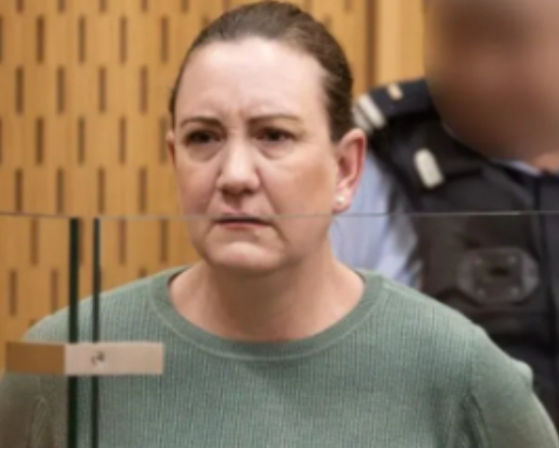News
Sad! Woman snuffs life out of her three kids

By Kayode Sanni-Arewa
A New Zealand judge on Wednesday sentenced a woman to 18 years imprisonment for murdering her three young daughters in 2021.
Lauren Dickason will begin her sentence at a mental health hospital in the custody of the state, a court official at Christchurch High Court told AFP, for the triple killings.
In a statement to local media after her sentencing, Dickason said she had “failed” her children and her husband, who has since moved back to South Africa.
“I take responsibility for taking our three beautiful girls from this world,” she said.
“I would like to take this opportunity to convey the deepest and most sincere remorse for the extreme pain and hurt caused to my children and my family by my actions.”
Justice Cameron Mander did not impose a minimum non-parole period in sentencing Dickason, who escaped life imprisonment which is the usual penalty for murder in New Zealand.
Dickason was found guilty last August on three counts of murder having smothered her two-year-old twins Maya and Karla and first daughter Liane, six.
The killings took place in September 2021 at their home in Timaru while her husband was out to dinner with colleagues. He found the bodies of his children when he returned home.
The family had moved to New Zealand from South Africa just weeks before.
During last year’s trial, Dickason admitted killing the girls but had argued a defence of insanity and infanticide, triggered by the stress of the move.
Under New Zealand law, infanticide is a defence for a mother who causes the death of her child when, “at the time of the offence, the balance of her mind was disturbed”.
Dickason’s lawyer had argued that a mental health unit was the most appropriate place for her, according to local media reports.
News
2025 UTME begins at CBT centres nationwide

The 2025 Unified Tertiary Matriculation Examination (UTME) has begun at various Computer Based Test (CBT) centres in the Federal Capital Territory (FCT) and across states of the federation.
It is believed that more than two million candidates would be writing the examination nationwide.
The examination conducted by the Joint Admissions and Matriculation Board (JAMB) is expected to come to an end on May 5.
At the Sascon International School CBT centre, candidates reported a smooth and hitch-free experience.
One of the candidates at the centre, Emmanuel Ezegwu, said the exam was easier than the previous years.
“This centre is better. I wrote this exam last year but I can tell you that the experience this year is commendable. There are no issues as far as I am concerned with this exam,” he said.
Another candidate, Vitoria Bilala, an 18-year-old candidate and first-timer to write JAMB, described the experience as good, despite feeling a little nervous while writing the exam.
“I quite commend the way they organise the exam because there were little or no hitches in this centre.
“At first, I was having technical problem but immediately I called on the supervisor, it was resolved. I felt nervous being my first time of writing this exam,” she said.
The centre supervisor, Emmanuel Adaji, stated that out of 200 candidates slated for the exam, only 11 were absent.
Speaking on the candidates’ lateness to the centre that resulted to rescheduling of their exam, Adaji advised candidates to arrive early.
He advised candidates coming from neighbouring state to make arrangements to come earlier than the day scheduled for their exams and stay overnight if necessary.
He lauded the synergy between the centre’s management and Nigeria Security and Civil Defence Corps (NSCDC) officers, for maintaining security and orderliness at the centre.
At Christ Academy International School, Gwagwalada, the examination is going on well without any hindrance.
Abdulrahman Salihu, a candidate, who was among the first batch slated for 6:30 a.m., said the exam was okay, including very good functional computer systems.
Another candidate, Charity Danjuma, also corroborated Salihu’s statement, stating that she did not experience any technical issues with the computer system.
Danjuma, who expressed optimism that she would gain admission with this year’s exam, said that she had written UTME for the fourth time.
Stephanie Okwori, a candidate at Future Gate Academy, Ado in Nasarawa state, described the exam as “stress-free,” commending the officials for rendering assistance, as well as providing a conducive environment.
Okwori noted that the questions were manageable, allowing her to finish within the allotted time.
Joseph Joshua, another candidate at Future Gate Academy, shared a similar experience.
“The biometric verification started by 6:30 a.m., which gave me enough time to settle in before the exam,” he said.
Joshua also commended the calm atmosphere and professional conduct of the invigilators, expressing optimism about his performance.
However, Clara Ajayi, a candidate at Bingham University’s exam centre, reported a minor delay in seating arrangements.
(NAN)
News
2027 done deal, more governors joining APC – Ganduje declares

The ruling All Progressives Congress APC on Thursday declared that the 2027 general election was already a “done deal”, vowing to win all off-season elections before then.
National Chairman of the party, Dr Abdullahi Ganduje disclosed this when he formally received some defectors from the Kano State chapter of the New Nigeria Peoples Party NNPP, led by the Senator representing Kano South, Senator Kawu Ismaila.
Ganduje also confirmed that the party is expecting more governors from the opposition parties to join the APC fold very soon, following Wednesday’s defection of the Delta state Governor, Sheriff Oborevwori to the APC.
Aside Senator Kalu, other politicians from Kano state who joined the APC include; Hon. Kabiru Alhassan Rurmum, Representing Rano/Kibiya in the Federal House of Representatives, Hon. Abdullahi Sani Rogo, Rt. Hon. Zubairu Hamza Massu, member Kano State House of Assembly, Dr. A B. Baffa Bichi, former Secretary to the State Government, Hon. Mohd Digol, a former Commissioner in Kano state government, Hon. Abbas S. Abbas, a former Commissioner in Kano state, Hon. Sha’aban Ibrahim Lawal, a former governorship candidate, Hon. Badamasi Ayuba Danbatta, a former member, House of Representatives, and Hon. Idris Dankuwa, also a former member, House of Representatives.
Speaking after a closed-door meeting with the new entrants, Ganduje said; “In APC, we believe in our president, Asiwaju Bola Ahmed Tinubu. We believe in his economic reforms, we believe in his Renewed Hope Agenda and part of the political renewed hope agenda is trying to canvass for more followership into the party.
“We started by democratically electing governors, especially in Edo State, who was in PDP, we elected, we succeeded in winning the election, he is now in APC.
“Now, there is another channel that has been opened through advocacy, through dialogue, through convincing some highly and even elected governors to come into the party and you can see what has happened now.
“The governor of Delta State is now in APC, including his cabinet, including all the members of the state assembly and House of Representatives, and the timber and calibre of PDP, now in APC, even including the former vice presidential candidate coming into our party.
“So, you can see that we are expanding.
I don’t want to reveal our secret, but what I am telling you is that for APC, 2027 is a done deal.”
Asked about reports of possible defection of some state governors into the APC, Ganduje said, “more governors are coming into APC, I assure you, and places where we have election, APC will by God’s grace, win those elections”.
On his part, Senator Kawu, who led the delegation said; “This is the coming together of likeminds in NNPP Kano state.”
On the value he is bringing into the APC, Kawu said; “I will refer you to 2023 general election. Go and check the results. I mean the Presidential, Senatorial, and House of Representatives elections, where we contested the same day, the same polling unit with Kwankwaso. That will give you the answer to your question.
You will see my result, his (Kwankwaso) result, and various members of the House of Representatives on that very day.
“Then the subsequent election, the senatorial and state assembly members, you will see the difference and you will understand what we are telling you”, he explained.
News
Court orders arrest of six in connection with alleged $1bn CBEX crypto scam

A Federal High Court sitting in Abuja has issued a warrant for the arrest and detention of six promoters of the collapsed cryptocurrency investment platform, Crypto Bridge Exchange (CBEX), over an alleged $1 billion scam targeted at Nigerian investors.
Justice Emeka Nwite granted the orders on Thursday, following an ex parte application filed by the Economic and Financial Crimes Commission (EFCC).
Those named in the EFCC’s motion include: Adefowora Abiodun Olanipekun, Emmanuel Oku, and four other individuals accused of using a company, ST Technologies International Limited, to promote CBEX and solicit cryptocurrency investments from unsuspecting Nigerians.
In the court, EFCC counsel Fadila Yusuf requested an order authorising the Commission to detain the suspects pending the conclusion of investigations and possible prosecution. She told the court the defendants were not yet in custody and explained that the syndicate involved foreign collaborators and digital wallets outside Nigeria’s banking system.
According to the EFCC, the suspects allegedly lured investors by promising returns as high as 100% on cryptocurrency deposits, primarily in stablecoin USDT. Over $1 billion in digital assets was reportedly collected before the CBEX platform became inaccessible, successfully locking out thousands of investors.
The anti-graft agency said that ST Technologies, while registered with the Corporate Affairs Commission (CAC), is not licensed by the Securities and Exchange Commission (SEC) to operate as an investment firm.
The EFCC also noted that a Special Control Unit Against Money Laundering (SCUML) certificate obtained by the company does not grant legal permission to offer investment services.
Justice Nwite, after reviewing the Commission’s application, ruled in favour of issuing arrest warrants and granted the request to remand the suspects in EFCC custody once apprehended.
The EFCC seeks to place the accused persons on Interpol’s Red Notice watchlist as part of broader efforts to recover investors’ funds and prosecute those involved in the alleged scam.
CBEX, operated by foreign nationals in partnership with Nigerian promoters, collapsed in April 2025. The platform had promised 100% returns within 30 days, drawing in a large number of users who later lost access to their accounts with reports indicating that the scheme required users to deposit additional funds to regain account access shortly before shutting down, triggering widespread public outcry.
The House of Representatives has since cautioned celebrities and influencers against promoting unregistered investment platforms, citing the CBEX case as a warning.
Investigations into the full extent of the scheme are ongoing.
-

 Economy16 hours ago
Economy16 hours agoSEE current exchange rate of the Dollar to Naira
-

 News20 hours ago
News20 hours agoJust in: PDP can never die over gale of defection -Hon Teejay Yusuf insists
-

 News13 hours ago
News13 hours agoJUST IN: Rivers Sole Administrator Ibas Shun Reps Panel
-

 Opinion22 hours ago
Opinion22 hours agoCBN under Cardoso and $6.83 Billion balance of payments surplus in 2024 that signals economic resurgence
-

 News24 hours ago
News24 hours agoUS indicts Nigerian for $690k scam, false citizenship claim
-

 Metro24 hours ago
Metro24 hours agoTwo killed, 20 farms destroyed in fresh Plateau attack
-

 News16 hours ago
News16 hours agoFCT Flags Off One-Week Free Holiday Vocational and Entrepreneurship Training
-

 News24 hours ago
News24 hours agoCourt orders 54 banks to return N9.3bn stolen by hackers





